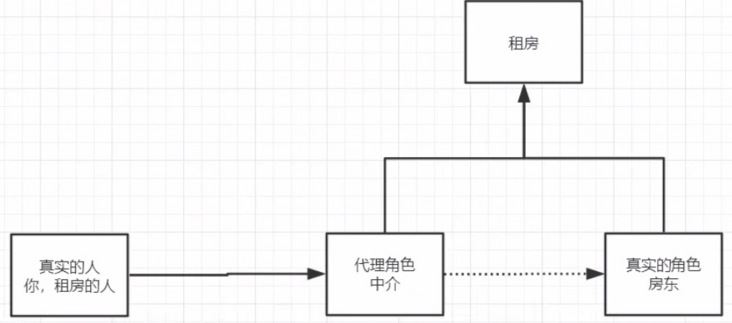The underlying principle of spring AOP is the proxy mode, which can be divided into:
- Static proxy
- Dynamic agent
Static proxy

Role analysis:
- Abstract role: generally, interfaces or abstract classes are used to solve the problem of rent
- Real role: the role of the agent [landlord]
- Agent role: acting for real roles. After acting for real roles, we usually do some ancillary operations [intermediary]
- Client: the person who visits the agent [tenant]
Code steps:
1. Interface
//Rent a house
public interface Rent {
public void rent();
}2. Real role
//landlord or landlady
public class Host implements Rent{
public void rent(){
System.out.println("The landlord wants to rent the house!");
}
}3. Agent role
public class Proxy implements Rent {
private Host host;
public Proxy(){
}
public Proxy(Host host) {
this.host = host;
}
public void rent(){
seeHouse();
host.rent();
contract();
fare();
}
public void seeHouse(){
System.out.println("The agent will show you the house");
}
public void contract(){
System.out.println("sign a contract");
}
public void fare(){
System.out.println("Intermediary fee");
}
}4. Client access agent role
public class Client {
public static void main(String[] args) {
//The landlord wants to rent a house
Host host = new Host();
//Agent, the intermediary helps the landlord rent a house, but the agent role usually has some ancillary operations!
Proxy proxy = new Proxy(host);
//You don't have to face the landlord, just find an intermediary to rent a house!
proxy.rent();
}
}Benefits of agent mode:
- It can make the operation of real roles more pure without paying attention to some public businesses
- The public is handed over to the agent role to realize the division of business
- When the public business is expanded, it is convenient for centralized management
Disadvantages:
- A real role will produce a proxy role, double the amount of code and low development efficiency
Dynamic agent
- Dynamic agents have the same role as static agents
- The agent class of dynamic agent is generated dynamically, which is not written directly
Dynamic agents are divided into two categories: interface based dynamic agents and class based dynamic agents
- Interface based: JDK dynamic agent [used here]
- Class based: cglib
- java bytecode implementation: javasist
Two classes need to be understood: Proxy: Proxy; InvocationHandler: call handler
Dynamic proxy class:
public class ProxyInvocationHandler implements InvocationHandler {
//Proxy interface
private Object target;
public void setTarget(Object target) {
this.target = target;
}
//Generated proxy class
public Object getProxy(){
return Proxy.newProxyInstance(this.getClass().getClassLoader(), target.getClass().getInterfaces(),this);
}
//Process the proxy instance and return the result
public Object invoke(Object proxy, Method method, Object[] args) throws Throwable {
log(method.getName());
//The essence of dynamic agent is to use reflection mechanism
Object result = method.invoke(target, args);
return result;
}
public void log(String msg){
System.out.println("Yes" + msg + "method");
}
}Test class:
public class Client {
public static void main(String[] args) {
//Real role
UserServiceImpl userService = new UserServiceImpl();
//Proxy role, does not exist
ProxyInvocationHandler pih = new ProxyInvocationHandler();
pih.setTarget(userService);//Sets the object to proxy
//Dynamically generate proxy classes
UserService proxy = (UserService) pih.getProxy();
proxy.add();
}
}Benefits of dynamic agents:
- It can make the operation of real roles more pure without paying attention to some public businesses
- The public is handed over to the agent role to realize the division of business
- When the public business is expanded, it is convenient for centralized management
- A dynamic agent class represents an interface, which is generally a corresponding type of business
- A dynamic proxy class can proxy multiple classes as long as it implements the same interface